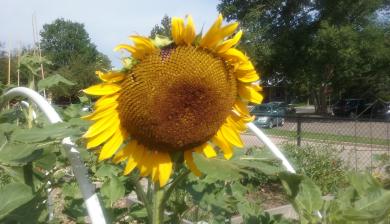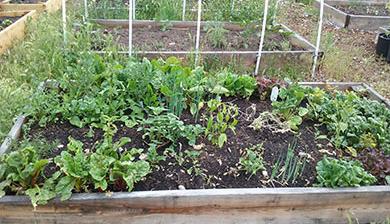Community Garden Harvest Party Marks a Bountiful Year
Students, faculty and staff, and community members gathered in DU's Bridge Community Garden on October 17, a beautiful autumn day, to celebrate the garden's second season.
The celebration was part of DU Food Week, a series of events organized by the Center for Sustainability to spur awareness of the social, environmental, and economic impacts of sustainable food.
The community garden was launched in spring 2015 to provide a space where DU community members can gather to grow their own food and work toward the shared goals of sustainability and education. More than 100 volunteers have been involved, doing everything from planting vegetables to installing irrigation and constructing a greenhouse and pergola.
"The garden brings students, faculty and staff, and the community that surrounds DU together in one spot," says sophomore Abbey Churchill, an environmental sciences major and member of Students for Sustainable Food. "We work together and bond over what we grow."
Sodexho, DU's dining services contractor, played a major role in the garden this summer. Staff member Julie Huong worked full-time among the plots, growing five different types of herbs for use in campus kitchens as well as managing general garden maintenance.
"Our local procurement of food is still relatively small on the grand scale of things," says DU alum Mandilyn Beck, Sodexho's Sustainability Coordinator. "In order to move toward a more sustainable future, we need to start growing food at our institutions, so that we're taking responsibility for becoming more local and sustainable."
Located outside Boettcher West, the garden is conveniently close to both the Division of Natural Sciences & Mathematics and the Center for Sustainability, allowing it to serve as an outdoor laboratory.
Julie Morris, a professor in the Department of Biological Sciences and one of the garden leaders, uses the garden to teach students about soil biodiversity, pollination ecology, phenology, and more. "Campus gardens can be thought of as 'living classrooms' and offer unique opportunities for students to learn about their environment and other important issues facing society, such as food access, loss of biodiversity, and climate change," she says.
Professor Shannon Murphy, also from the Department of Biological Sciences, has hosted short courses in the garden on ecology for teachers and students from Denver Public Schools, including a summer institute on how to implement an inquiry-based science curriculum. She also presented an insect workshop for faculty and staff in the garden as part of the DU Wellness Program.
"We teach participants how to recognize pest insects, but more importantly we also teach them to recognize insects that are a gardener's ally," Murphy says. "Many gardeners get rid of beneficial insects because they have never learned how to tell them apart."
The garden is home to a fledgling honeybee colony, in collaboration with Denver's Urban Pollination Project. Thanks to an Olin Faculty Development Grant from the Division of Natural Sciences & Mathematics, Morris and Murphy are building beekeeping capacity among garden volunteers. Eva Horna Lowell, an undergraduate biology major, is even studying the colony as part of her senior thesis on honeybee recruitment.
Funding for the garden is provided primarily by the Center for Sustainability, which sees the garden as a way to address overlapping sustainability challenges. "The garden provides an intersection between community building, understanding food systems and seasonality, campus food production, food justice and food insecurity, health and wellness, stress management, and the use of campus as a living learning laboratory," says DU Sustainability Coordinator Chad King.
The garden also serves as a conduit from DU to the greater community through an affiliation with Denver Urban Gardens (DUG), a network of community gardens across the city. Denver residents who live near campus are able to rent plots.









